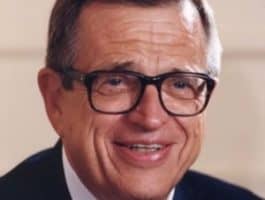
A Father and His Daughter
Dark clouds often have rainbows behind them. Chuck Colson talks about the experience that nearly cost him his life, and, surprisingly, drew his daughter back to him. Joining him in the studio is his daughter, Emily.
Show Notes
About the Host
About the Guest
-
Dark clouds often have rainbows behind them. Chuck Colson talks about the experience that nearly cost him his life, and, surprisingly, drew his daughter back to him. Joining him in the studio is his daughter, Emily.
-
Dave and Ann Wilson
Dave and Ann Wilson are hosts of FamilyLife Today®, FamilyLife’s nationally-syndicated radio program. Dave and Ann have been married for more than 38 years and have spent the last 33 teaching and mentoring couples and parents across the country. They have been featured speakers at FamilyLife’s Weekend to Remember® marriage getaway since 1993 and have also hosted their own marriage conferences across the country. Cofounders of Kensington Church—a national, multicampus church that hosts more than 14,000 visitors every weekend—the Wilsons are the creative force behind DVD teaching series Rock Your Marriage and The Survival Guide To Parenting, as well as authors of the recently released book Vertical Marriage (Zondervan, 2019). Dave is a graduate of the International School of Theology, where he received a Master of Divinity degree. A Ball State University Hall of Fame quarterback, Dave served the Detroit Lions as chaplain for 33 years. Ann attended the University of Kentucky. She has been active alongside Dave in ministry as a speaker, writer, small-group leader, and mentor to countless wives of professional athletes. The Wilsons live in the Detroit area. They have three grown sons, CJ, Austin, and Cody, three daughters-in-law, and a growing number of grandchildren.
-

Chuck Colson
Evangelical Christianity lost one of its most eloquent and influential voices on April 21, 2012 with the death of Charles W. “Chuck” Colson. Colson was the founder of Prison Fellowship and Colson Center for Christian Worldview A Watergate figure who emerged from the country’s worst political scandal, a vocal Christian leader and a champion for prison ministry, Colson spent the last years of his life in the dual role of leading Prison Fellowship, the world’s largest outreach to prisoners...more
Emily Colson
The only daughter of Chuck Colson, founder of Prison Fellowship, Emily Colson is an author and a speaker, traveling to churches and organizations nationwide. She has appeared on numerous media outlets including Focus on the Family and the Huckabee Show.
Dark clouds often have rainbows behind them.
Chuck: The hardest thing for me in Watergate, you feel like you’ve let down your kids and your family.
Emily: It was a confusing time. There was so much media and attention and it was confusing for me as a teenager.
Chuck: And I was just agonizing over it.
Emily: It was a tough time. It was difficult to have a lot of people saying ugly things about someone that you love.
Chuck: So I took her out to National Airport and as she started to turn away I grabbed her. I said, “Emily, I hope you’re not embarrassed by what I’ve done.” And she looked at me with this quick and stern look and said, “No, Daddy, I am proud of you.” We hugged and embraced and I was crying as I was standing in the runway of that plane.
Bob: This is FamilyLife Today for Monday, November 29th. Our host is the President of FamilyLife, Dennis Rainey, and I’m Bob Lepine. We can all reflect on the impact the Watergate episode had on our nation. Today we’re going to spend time looking at the impact it had on one family, the Colson family.
And welcome to FamilyLife Today. Thanks for joining us on the Monday edition. We’re going to hear a compelling family story today.
Actually, we’ve got some compelling news that we want to share with our FamilyLife Today listeners before we get into today’s program. We’ve had some friends of the ministry who have stepped forward in recent days and have made available to us a year-end matching gift that frankly is extraordinary.
It’s a little over $2 million at this point. It’s the largest matching gift challenge that we’ve ever received, and we’re hoping to take full advantage of this matching gift. To do that, we’re asking listeners to consider making a year-end donation to FamilyLife Today. And Dennis, when they do, that donation is going to be matched dollar for dollar from this matching gift fund.
Dennis: And it couldn’t come in a more timely fashion for us here at FamilyLife. As you know, Bob, earlier this year we actually had to cancel FamilyLife Today on some stations because of the lack of financial resources to be able to stay on those stations. So our broadcast is made possible by you, the listener.
If you’d like to be a part of this matching challenge, which is historically the biggest one, as Bob said, that we’ve ever received in the history of our ministry, I’d just like to challenge you to write out a check and be generous. And then check our progress throughout the month of December and see how we do.
Bob, as you know, this is a stretch goal. This is not a foregone conclusion that we’re going to be able to match this gift dollar for dollar throughout the month of December. As you know, we’re swinging for the fences and we want to be there to help you, to help your family, to help your friends, and to provide resources for you that help them build their house on the rock of Jesus Christ.
I just think as never before today the Bible and the Gospel of Jesus Christ provide the solutions for marriages and families. If there was ever a time when FamilyLife Today needed to be expanding and grow stronger, it’s now. So I’d like to ask you, will you stand with us and will you help us with a generous gift?
Bob: You can donate online at FamilyLifeToday.com or you can call us to make a donation at 1-800-FLTODAY and we want to say thanks in advance for whatever you are able to do. We appreciate your financial support.
Now, as I mentioned, we’re going to get a rare glimpse into a family story today, aren’t we?
Dennis: We are. We have a couple of very special people who join us on FamilyLife Today, Chuck Colson and his daughter, Emily. Welcome to the broadcast.
Chuck: Thank you, Dennis. Great to be with you guys.
Dennis: Emily, great to have you here as well.
Emily: Thank you so much.
Dennis: Emily is an artist, a writer – and by the way, you’re going to like Barbara. We’re going to have dinner a little later, but you’re going to like her a lot because she’s an artist as well. She is a single parent mom of a young man by the name of Max. You’ll hear more about his story a little bit later.
Chuck Colson doesn’t need a lot of introduction. He is an author, a speaker; he is the host of Breakpoint.
Bob: Hang on. He’s Emily’s dad. Let’s get the important stuff –
Chuck: That’s the biggest thing right there.
Bob: That’s right.
Dennis: He is Emily’s father. He and his wife, Patty, have three children and five grandchildren and really, my first question is about the book Dancing with Max, which is the book that Emily has written. Honestly, Chuck, you really surprised me because in the prologue that you wrote for Emily’s book you grabbed me by the heartstrings, immediately.
You made a statement – it was a transition statement in the book – I’m going to let you set this up, but you said, “Thus began an experience that nearly cost me my life, but gained my daughter back.” Powerful story!
Chuck: Well, it was a powerful experience for me, because I was the guy that was always in a hurry. I was out to save the world when I was twelve years old. I was writing letters during World War II about selling war bonds and buying stuff for the troops. I’ve always had this streak of idealism; that’s what sent me into politics. When I was in the Marine Corp I was driven to be the Commander of the outfit, always getting to the top in things.
I didn’t know what it was to be a dad. I didn’t do a very good job, and Emily and I had particularly – we never really had that close of a relationship. I was in the Philippines when I started hemorrhaging, bleeding internally, and could have died because I made a foolish decision actually to fly home, and ended up in Georgetown Hospital with surgery. It didn’t go well. It was infection, staph infection. I almost died there in the hospital.
Emily moved down, came actually from Boston, and stayed in that room for eleven days, she and Patty. I don’t think Emily ever left the room. We had the greatest relationship even though I was half delirious at times, because we just bonded close, very close. I ended up praying with Emily in the room and it was just a completely different relationship. Ever since that experience we’ve been as close as a father and daughter could ever be.
Bob: This was how many years ago that this happened?
Chuck: This goes back to 1987 – a long time.
Dennis: Emily, what was your favorite moment during those eleven days? Was there one that really stands out to you about those moments with your father when he was really near death?
Emily: It was very precious. I think I knew how almost sacred that time was for us to be together in that room. My dad is a pretty independent guy, a pretty capable guy, and this was the first time that he ever really needed me, or I ever knew that he needed me. And so it was so wonderful for me to just sit beside him, hold his hand, talk him through the delirious experiences he was having with the drugs and put a cool cloth on his head. It was a really precious bonding time for us to be together.
Bob: If I had been talking with you a year before that event and just said to you, “Describe for me your relationship with your dad.”
Emily: I loved him; he loved me. He was a Christian then. He became a Christian when I was a teenager, but I was busy. I was very busy thinking about teenage things and thinking about myself, and I don’t think I ever realized how available he had become as a dad. It wasn’t until that time in the hospital that he really needed me that I suddenly saw this very different man and really began to see my dad.
It was just after that that my life really became difficult, and I was so grateful that we had bonded in this way and I could lean on him at that point.
Dennis: You know, what really blindsided me, Chuck, was not only did you start it talking about this very endearing relationship that you cultivated with Emily in the hospital, but it did cement your hearts together so much so there was another time when you said goodbye to her at the airport. You said you sobbed like a baby, and I’m picturing Chuck Colson, and that’s --
Chuck: A pretty unlikely scene, isn’t it? Yes, it was during Watergate. The hardest thing for me in Watergate – well, a lot of hard things. I mean, all of a sudden you’ve had this meteoric rise in political power, and you’re sitting in the office next to the President of the United States when I was 39 years old. That’s pretty heady business. And suddenly you’re public enemy number one, splashed across the headlines of the newspapers. Everything I’d worked for building the Nixon administration is collapsing around me and I’m thinking my whole world is collapsing.
I think the worst thing is, you feel like you’ve let down your kids and your family, and I was just agonizing over Emily, then 15 or 16, where kids were making fun of her because her father was this bad guy in the public eye. So when she came to Washington for a visit before I knew I was going to be sentenced, I wanted to get her home before the sentencing because I didn’t want to put her through the courtroom experience.
So I took her out to National Airport. This was before security. This is when you could walk down to the actual gangway to the plane, and as she started to turn away, I grabbed her. I said, “Emily, I hope you’re not ashamed of your father. I hope you’re not embarrassed by what I’ve done.” And she looked at me with a quick and stern look and said, “No, Daddy. I am proud of you.”
We hugged and embraced, and I held it back until she got on the plane and I couldn’t hold it back any more. I just stood there at National Airport, the White House Hatchet Man, the tough guy, ex-Marine Captain, and I was crying my eyes out, standing in the runway of that plane. Emily was flying back to Boston.
Dennis: I wish our listeners could see the look on Emily’s face right now.
Emily: I remember that hug. I remember it very well, and I remember it as a daughter, as a child. But now I see it as a parent myself, and I know what that was for you.
Chuck: Well, the other interesting thing that happened, Dennis, when Watergate was really crashing around me and I was given a chance to plea bargain – and plea bargain would mean that I could keep my license to practice law – I had to testify against Nixon the prosecutors told me, which I didn’t want to do because he was my friend and I was loyal to him, but also what they wanted me to say wasn’t true. But I asked the kids, I asked Wendell, Chris and Emily. Emily was the one who, when she heard it, turned to me and said, “Well, did you do it Dad? Was it true?” And I said, “No.” And she said, “Don’t say it was,” just as tough as that. I mean, she knew what the stakes were and it affected her, as well, so I always admired that toughness.
Dennis: You actually described her as being “military tough.”
(Laughter)
She’s holding her biceps at this point.
Chuck: You know, fathers want their sons to follow in their footsteps. I had loved being in the military, loved the Marine Corp, and I wanted my boys more than anything else to be Marines. Neither one did, but then I realized Emily turns out to be the one that’s as tough as the Marine Lieutenant, not the boys.
Bob: Emily, I’m just curious what it was like as a teenager to read accounts in the newspaper about all these things your dad had been doing and wonder if they were true and hear what people were saying. For you to stand there and say, “No, Daddy, I’m proud of you,” – were you being comforting or were you really proud of your dad?
Emily: I was proud of my dad, most definitely. I loved him, as much as we didn’t have the kind of relationship that we have now, I loved him desperately.
It was a tough time. It was difficult to have a lot of people saying ugly things about someone that you love. It was a confusing time. There was so much media and attention, and it was confusing for me as a teenager to understand what was real, what wasn’t real, but my dad was pretty clear about comforting us and telling us the truth. I know he told us the truth in what was going on, and I know that he was treated unfairly, so it was a complicated time.
Dennis: You ended up going away to college, then, and while at college, really you began your life in earnest by meeting a young man by the name of Gary. Can you share a little of how you met him and then started dating?
Emily: Well, when I went off to college, I think that something switched and that freedom was pretty enticing. Fortunately, by the grace of my parents there was another year that followed the first, but in many ways there shouldn’t have been, considering –
Bob: You got a do-over, is what you’re saying?
Emily: I got a do-over. I did.
Dennis: Were the grades that bad?
Emily: I don’t even remember my grades. I just remember the parties.
(Laughter)
So, it was an interesting time in life and met a young man there, and truthfully, I had no idea when I got to college how famous my dad was, until I arrived and every single person knew who I was and knew that I was coming to that school.
I remember telling this young man, Gary, how nice the school was. I was just so impressed with them. As he questioned me, he said, “Well, why are they so nice?” I said, “Because they come and knock on your door every month and they ask you how you’re doing, and the Dean comes by and checks on you.” He said, “They don’t do that for anyone else, Emily. They’re only doing that for you.” I had no idea that I was getting all this special attention and special treatment because I was the same. I knew who I was, I was this girl like anybody else at the college.
Dennis: You thought the Dean just came by and took care of every student there, right?
Emily: Everyone. What a nice place!
Dennis: But you met at that point, and you started dating Gary right away?
Emily: Right away. Yes, I did, and we married as soon as I finished college, and sort of landed in this Norman Rockwell moment. Everything was lovely – a beautiful town in Massachusetts, had a great job, and everything was going beautifully.
Bob: When did the Norman Rockwell picture start to fade and look different for you?
Emily: Well, I think about five years into the marriage it suddenly started to look a little bit different. We hit some pretty trying times and life threw some curveballs as they say, and it put a great deal of strain on the marriage, a great deal of strain on our relationship, and it really wasn’t strong enough to hold up. We did separate for a time, and then we reunited and felt that the relationship was stronger for it, that we understood each other better, and planned for Max.
Bob: Was there any spiritual foundation for your marriage? What had you done with your dad’s profession of faith? How had that impacted you?
Emily: Well, when I was in my mid-20s and life was really perfect, I began seeking. It’s not the time you think of, but it was so lovely in that Norman Rockwell moment that I thought, “Is this all there is? Isn’t there something more to life?”
I knew my dad’s faith, understood that as much as I could as a non-believer, really, and started to read the Bible. I started with Revelation, which is kind of funny, but I loved it. As an artist I was so captivated. I thought, “All of this is in here and I never knew it? This is fantastic!”
Dennis: Why did you start with that book?
Emily: Well, I thought I’d –
Chuck: To see how it ends.
Dennis: To see how the story ends, right?
Emily: That’s exactly what I did. I thought, “Well, this is a big book. Why don’t I just see how it all works out in the end?”
(Laughter)
I was so captivated.
Dennis: Were you aware, Chuck, of her spiritual interest at that point?
Chuck: Not really until she came to the hospital and we spent that week together. I could see it was registering with Emily, and I think that was a time when you were really softening towards the Gospel –
Emily: I was.
Chuck: And understood it better.
Emily: Most definitely.
Chuck: Although you had an experience in school. Tell that story; that’s very appropriate.
Emily: Oh-h-h. I had a girl in high school that came right across the cafeteria, made a beeline at me. She was new in the school –
Chuck: She’d heard about my conversion.
Emily: She’d heard about your conversion, and she came over, and she had a little book on her hand, and it was folded over, open to a page, and she shoved it in my face and she said, “Which life do you have? “ I looked at the pictures, and there was one illustration with God in the center and everything else around it, and one illustration with me in the center and everything else and God way out on the perimeter, and I said,
Bob: I think I’ve seen that book you’re talking about.
Emily: Have you seen that one? Yes.
Chuck: Thousands of them.
Emily: I bet you have. And I said, “Well,” -- you know it wasn’t exactly an SAT question – “I have the life with me in the center.” And she said, “Which life do you want?” and that’s where it really convicted me. I looked at it and I thought, “Well it really only makes sense to want the life with God in the center,” so I pointed to the one with God in the center.
And she got kind of shaken – I think she was really surprised – and she said, “Why don’t we go in another room, and we’ll pray.” Well then I got a little nervous, thinking, “Wait a minute. I don’t really know what I said, I don’t really know what I did,” but we went back to an empty classroom and she prayed for me, planted that seed in my mind. Of course, God knew, “I have created Emily as an artist. I’m going to show her pictures.” So it really was the most perfect thing for me.
Chuck: I’ve thought often about that, because a lot of times we present the Gospel to people or we confront them with that, and we get rebuffed – we think we get rebuffed. We’re not sure the message got through. You always can plant that seed.
Bob: Yes.
Chuck: And people should never be bashful about opportunities to do that, because it does lodge in the person’s consciousness, just as it did with Emily.
Emily: It did.
Bob: Were you aware when she came to visit you in the hospital that there had been rough patches in her marriage?
Chuck: No, I don’t think at that time I did. I didn’t understand it then. Emily never talked to me about that. I thought that it was kind of an idyllic life that they were living, and she’s married to this tall, dark, handsome guy, and everything’s going to be perfect for her. The visits that Patty and I would have – it was all sweetness and light, so –
Emily: And it was fine. I think it changed rather quickly when life got difficult.
Bob: We’re going to spend more time unpacking what that was, but for listeners who don’t know, Max was born with autism, right?
Emily: Yes, he was.
Bob: You were aware at birth that there was something different about Max?
Emily: We knew there was something. We didn’t have the diagnosis of autism, but it was clear: he didn’t sleep, he cried all the time, he didn’t make eye contact. At four months old I brought him into the doctors and said, “Why won’t he look at me?” He didn’t babble, he didn’t talk when he was supposed to, crawl, walk, -- any of those markers that we look for – so we knew something was different. It wasn’t until he was four years old that we actually had a diagnosis.
Dennis: You know, after reading your book, Emily, I kept thinking about the themes that you’ve written in here – and by the way, you really are a good storyteller.
Emily: Thank you.
Dennis: I love the honesty, the gritty honesty with which you tell your story. This is not some kind of veneer that you’ve shared with folks. You take them into the tough spots of being, ultimately, a single parent mom raising an autistic son, and I really appreciate that.
But the book not only deals with Max, Dancing with Max, but it also has this theme of a father and a daughter and how there can be reconciliation in a powerful way that can cement their hearts to one another, even in the midst of some dark days. I’m looking forward to hearing more of this story as we talk about it this week.
Bob: I think our listeners are going to want to get a copy of Emily’s book. It’s called Dancing with Max and it chronicles the story of the last twenty years of her life, and how God has been at work in the midst of it all. It’s a compelling story, a great story.
You can find out more about how to get a copy of the book, Dancing with Max, by Emily Colson when you go online at FamilyLifeToday.com. It’s FamilyLifeToday.com, or call us toll-free, 1-800-358-6329, that’s 1-800, F as in “Family,” L as in “Life,” and then the word “Today.”
Now we have a Christmas gift we’d like to send to you. I know we’re still a few weeks away from Christmas, but we have a special gift we’d like to give you that’s actually a book that was written and illustrated by Barbara Rainey. It’s called When Christmas Came. Barbara takes probably the most familiar verse in the Bible, John 3:16, and looks at the advent, the coming of Christ, through the lens of that declaration of God, that he has sent his Son that whoever would believe in him should not perish but would have everlasting life.
This is a book that your family can enjoy during the Christmas season, or you may want to pass it on to somebody who doesn’t know Christ as a Christmas gift. The book is our gift to you. It’s one per family when you call or go online to request it. If you’re new to FamilyLife, if you’ve never gotten in touch with us, this is a good way to find out a little bit more about who we are and what we’re all about as a ministry.
You can call 1-800-FLTODAY and ask for a copy of the book When Christmas Came, or you can go online at FamilyLifeToday.com and request your copy of the book and we’ll send it out to you. We hope that it is a meaningful part of your family’s celebration of Christmas this year.
We hope you can be back with us tomorrow. Chuck and Emily Colson are going to be here again. We’re going to hear about the early years of Emily’s journey with her son, Max, who at the age of four was ultimately diagnosed with autism. They’ll share their story with us tomorrow. I hope you can be here for that.
I want to thank our engineer today, Keith Lynch, and our entire broadcast production team. On behalf of our host, Dennis Rainey, I'm Bob Lepine. We will see you back next time for another edition of FamilyLife Today.
FamilyLife Today is a production of FamilyLife of Little Rock, Arkansas.
Help for today. Hope for tomorrow.
We are so happy to provide these transcripts. However, there is a cost to produce them for our website. If you've benefited from the broadcast transcripts, would you consider donating today to help defray the costs?
2010 Copyright © FamilyLife. All rights reserved.
www.FamilyLife.com




